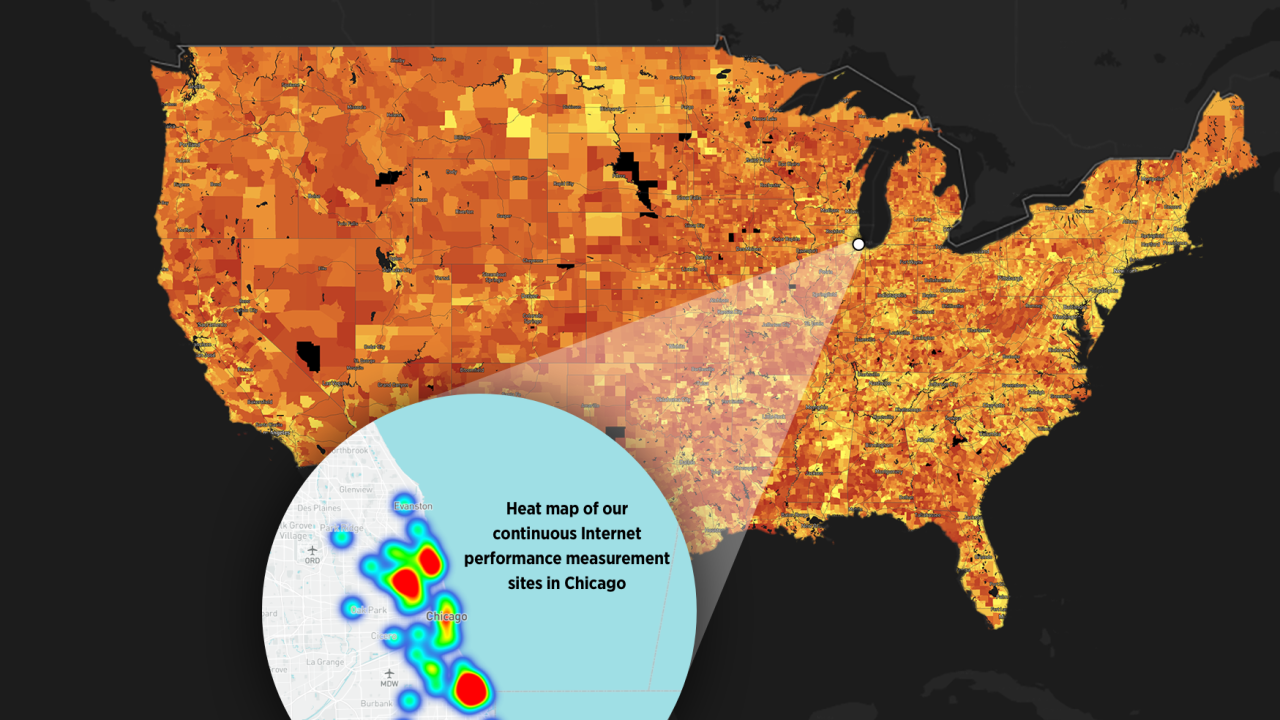University of Chicago – Mapping and Mitigating the Urban Digital Divide
Cities and Towns

SUBMITTED BY
University of Chicago, Center for Data and Computing (CDAC)
PARTNERS
KidsFirst Chicago; City Tech Collaborative
LOCATION
United States
Access to telehealth, professional environments, and education all depend on affordable, high-speed internet access. The COVID-19 pandemic has accelerated and magnified a lack of access and equity to reliable internet, even within the same city. Access refers to whether high-speed internet infrastructure is available where you live, and equity is about whether people can afford to pay for internet, whether they know how to use it effectively, and how well the infrastructure they connect to actually performs.
Harnessing the Power of Data:
Inclusive Growth and Recovery Challenge Impact Report
The Internet Equity Initiative (IEI), through distribution of its internet measurement toolkit, has generated approximately 1.11 billion unique data points across eleven standard network performance measurements from 139 devices deployed across Chicago from October 2021 to March 2023. The data has been used to validate one local ISP’s approach to extending internet infrastructure to underserved communities; expose and fix inaccuracies in commonly used measurement tools, such as, Measurement Lab’s NDT7 tool and identify performance gaps between communities in Chicago, Detroit, and beyond to Massachusetts, Michigan, California, and Oregon.

Highlights
-
1
Home Internet Performance Study
Through a pilot study in Chicago, Internet Equity Initiative (IEI) created the first wide-area deployment of dedicated measurement devices in the country, which continuously collect network performance data at the household level. To date, IEI has deployed over 150 devices across Chicago through the study. The deployment generated a unique dataset on home internet performance containing measurements of upload and download bandwidth, latency, and reliability along with supplemental survey and geographic data, enabling unprecedented comparisons of disparities between neighborhoods. In 2022,
the dataset saw a 500-percent increase, growing from 58 GB to 350 GB. -
2
Establishment of Community Partnerships
IEI initiated multiple partnerships with community organizations to support their efforts to advance internet equity, including collaboration with the City of Chicago to create and execute a research agenda responsive to the city’s most pressing broadband policy needs. They also collaborated with the non-profit organization, the Quilt Corporation, which runs the Chicago Area Broadband Initiative to develop low-cost wireless solutions for the south and west sides of Chicago. Thanks to successful outreach, the team connected with three state broadband offices (Massachusetts, Michigan, and Illinois) and will continue exploring synergies to aid each office with their specific needs.
-
3
Field Staff Data Training and Deployment
IEI launched a public-facing website and data repository to disseminate information on the initiative’s mission and progress; to share new research and insights stemming from the initiative’s work; to showcase the national map displaying data on internet adoption, usage, and performance; and to provide access to their unique dataset on home internet performance in Chicago. The website highlights key research findings stemming from the in-home broadband study and the work with community organizations and student groups. The portal received significant local media coverage during the initial launch and continues to serve as a useful hub for local and national resources for advancing internet equity.
Looking Ahead
IEI worked with important leaders in internet measurement and mapping to promote the use, standardization, and replication of their measurement software, backend infrastructure, and resources for collaborating with communities to collect granular internet performance data. In addition, IEI has begun to leverage the methods, data, and tools flowing from data.org’s grant to secure over $1 million in additional funding to expand the platform into a functional research network testbed. These new funds will be directed toward scaling their deployments from 100 devices to 1000 devices in Chicago over the next couple of years.